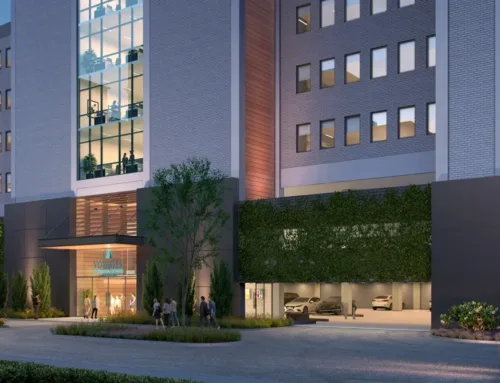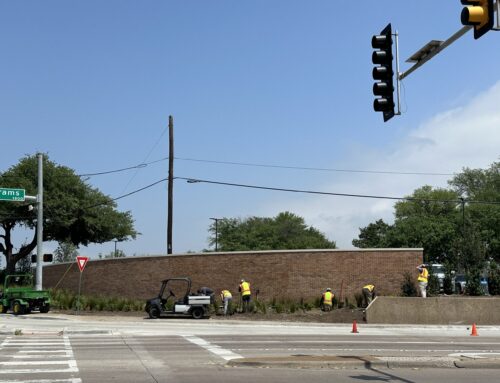When the Battles Involve Zoning, the Lines Between Residents and Developers Quickly Become Blurred. Who Wins Out Will Affect Our Lives and Property Values.
Homeowners and business people are close neighbors in East Dallas and Lakewood. That’s good, because the proximity of shops and restaurants is a charming aspect of urban living.
But the same neighbors can also find themselves competing for limited real estate, leading to bitter conflict between homeowners and entrepreneurs asking for parking lots, group homes and single-room occupancy hotels.
While the two sides battle for turf, at stake for all of us is the delicate balance of City life.
Prominent Dallas restaurateur Phil Cobb says he has a parking problem at the San Francisco Rose restaurant on Lower Greenville Avenue, but angry neighbors insist Cobb is really playing a game of dominoes.
Cobb wants to build a 20-space parking lot on the northeast corner of Marquita and Greenville, across from the Rose, a busy restaurant and bar that has catered to the young professional crowd for about 15 years.
The City Plan Commission recently approved Cobb’s rezoning request on the Marquita property, and the City Council probably will make a final decision March 24.
Homeowners promise a vocal presence at that council meeting. They say the corner across from the Rose is the first domino, and they can’t afford to let it fall, or other corner lots up and down Greenville will follow.
The territorial conflict on Greenville is an old one, with club owners seeking more parking for their customers and homeowners attempting to maintain neighborhood stability.
Neither group cares for the overflowing traffic from outside the neighborhood that fills residential streets during peak club hours nights and weekends. The bar customers make noise, toss beer bottles on sidewalks and attract thieves who break car windows and rip stereo systems from the dashboards. Every Friday night, a fresh crowed of suckers parks on the streets, and every Saturday morning, shiny piles of broken auto glass litter the pavement.
Cobb says new parking to supplement existing curbside spots on Marquita and Greenville and the few spaces behind his restaurant would serve both his customers and the community.
Cobb admits that when he bought three houses on Marquita about four years ago, he hoped to build a parking lot on the corner property.
After the Plan Commission denied his first rezoning request in 1990, he tore down the corner house and laid down gravel. But he says he spent $75,000 to repair the other two houses, now occupied by renters.
Cobb promises a neat, well-kept parking lot with access only to Greenville Avenue and is offering deed restrictions to prevent rezoning of the rent houses or expansion of the Rose.
Homeowners contend Cobb plans to ask for both if he gets his parking lot.
“I believe in my heart of hearts I’m solving a problem,” Cobb says. “This case helps take a number of my customers off the street and puts them in a well-lit parking lot.
“It frees up some of the penetration into the residential area. It’s a reasonable, sensible request, and there’s nothing wrong with me asking that.”
But Robert Sullivan, co-president of the Lower Greenville Avenue Neighborhood Association, believes differently.
“Nobody wants to live next to a parking lot. If this zoning request goes through, there are a number of other properties up and down Greenville that will see similar requests, and it’s going to be hard for the Plan Commission and the Council to deny them.”
Sullivan says the courts will not enforce deed restrictions because of past use to discriminate against members of minority groups.
“Zoning exists because deed restrictions are unenforceable,” he says.
Sarah Perkins, who has lived a block north of Marquita on Monticello Avenue since 1978, says the City has betrayed homeowners. She points to neighbors such as Evangeline Garcia, a 30-year resident who spent $60,000 to improve her corner house on Monticello and Greenville.
When Garcia approached the Planning Commission in 1988 about converting her house to a four-plex, they labeled her request “spot zoning” and told her to forget about it.
“This is a chilling chain of events,” Perkins says. “One wonders about all the lip service paid at the City about trying to maintain stable inner city neighborhoods when they say: ‘Let’s put a parking lot in a residential block.’”
Perkins’ husband Lanny filed a notice (the neighborhood association has promised to cover the $150 fee) with the Department of Planning and Development that will delay City Council consideration of Cobb’s request until late March. The Perkins also claim the support of the Vickery Place and Greenland Hills neighborhood associations.
“I’m shell-shocked,” Sara Perkins says. “I knew we’d see this case revisited but it’s awful tiresome to fight these cases over and over again.
“You’ve got two kinds of people who live in the City,” she says. “The very rich who can afford to insulate themselves from their surroundings and the very poor. What happened to the middle class?”
Cobb says his request is “an isolated case, a case that makes a lot of sense. I don’t believe for a minute it decreases anybody’s property values because I’ve got as much of a financial stake in the area as anyone else. That’s what I’m fighting for.
“It’s unfortunate there’s been a lot of brick throwing from both sides. I want to continue to be a good neighbor,” he says.
As for the neighbors’ lack of trust: “Honest people make honest representations, and I’m doing the best I can to convince them that that’s what I want to do.”
The Next Domino? Greenville Avenue Church Faces Demolition
While the state historical commission decides how to preserve our memory of the Greenville Avenue Christian Church before the City demolishes the building, the old place keeps looking more like it’s going to fall down by itself.
A zoning impasse between the property’s owner and homeowners has led to condemnation of the church, located on the northeast corner of Greenville and Llano Avenue. Vandals have broken most of the windows, and neighborhood residents complain about its appearance.
John Holmes, who once owned the church and now manages it for a group called SBRJ, says he wanted to renovate the building in 1981 and install a restaurant and shops, similar to Olla Podrida in North Dallas.
But that would have required commercial zoning, which area homeowner groups opposed.
“The immediate homeowners voted in our favor, but homeowner associations that were politically connected shot us down,” says Holmes, who also manages several area apartment complexes.
“The City’s supposed to knock it down and eventually they will get to it. It’s kind of a shame, though,” he says.
According to the City’s Urban Rehabilitation Standards Board, officials must make a proper record of the church because of its historical value under Section 106 of the National Historic Preservation Act. They think they’re finally close to satisfying those requirements.
When that job is done, the City will demolish the church and bill the property owners. Holmes says he may then want to build a parking lot there.
Robert Sullivan of the Lower Greenville Neighborhood Association says the church’s status may depend on the outcome of Phil Cobb’s similar request to build a parking lot across from the San Francisco Rose restaurant on Greenville and Marquita.
I think that’s the next domino,” Sullivan says. “John Holmes bought the church with the intention of making a commercial use. Now it’s condemned. If this parking issue goes (in favor of Cobb), I think the church is next. John Holmes will say: ‘I can’t use this for residential so give me commercial.’”
Holmes says: “We were just sick about (his failure to obtain new zoning). It’s our opinion that the only thing that would be a winner for the community and us on this site would be a restaurant. We have all the parking that is required for what we want to do.
“Maybe times have changed,” he says. “Maybe somebody could go in and do something positive and influence the neighborhoods. I think things have changed. I hope so.”
East Dallas To Test High-Density Housing With Wales Building
Take the traditional inner-city boarding house, expand it to the size of a hotel, and you’ve got a formula that scares the heck out of homeowners.
But architect Graham Greene says the Wales Building at live Oak Street and Carroll Avenue will be a model for SRO (single-room occupancy) hotels when it opens later this year.
It’s guaranteed to stand as a model, bad or good. The property fits no zoning category as an SRO and is the first of its kind in Dallas. But Greene pledges to support new zoning that will limit the concentration of such buildings.
The building, formerly known as the Prince of Wales, was reportedly a popular honeymoon spot during the 1920s.
Architect James Rouses’s Baltimore-based Enterprise Foundation is underwriting loans for the $900,000 renovation. When work is finished, the Wales will include 61 units and 30 to 35 parking spaces, Greene says.
By terms of their agreement, Greene and partner Ken Murchison must own the property for 15 years.
The Wales will be a “residential hotel for single individuals” of all races, ages and sexes, Greene says. Residents will be required to meet income guidelines and follow the rules, as well as participate in management of the building. Each tenant will sign a one-year lease.
The Dallas Housing Authority will review applications and the U.S. Housing and Urban Development department will subsidize rents.
Such hotels have worked in Boston, Los Angeles and Shreveport, Greene says, although Plan Commission member Jonathan Vinson says they have earned a poor reputation in New York City.
Still, Vinson says: “A lot of social services people will tell you we have a need for (SROs) because of a gap in transitional housing. You’ve got the shelters and the people who sleep under the bridges, and the next step up is regular apartment, if you can afford the rent. A lot of people fall through the cracks.”
Greene says: “The people who come here to live are permanent residents. We don’t take people off the street. What we’re seeking is a stable population of low-income individuals.





